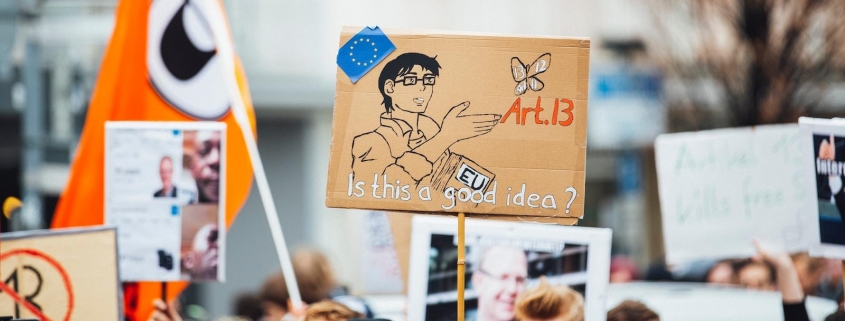A Copyright Directive has passed through the European Parliament by 348 to 274 votes. However, critics of the Directive argue that this could undermine freedom of expression online.
A Directive sets out the objective or policy which needs to be attained by all Member States. The Member States must pass domestic legislation to give effect to the directive within 2 years.
What will the Copyright Directive Do?
Articles 11 and 13 of the Directive states that search engines should pay to link to websites. Additionally, tech Giants including Facebook and Google will be responsible for any material posted WITHOUT a copyright licence.
This seeks to address the tech companies who earn huge amounts of money without recognising the journalists and creative thinkers whose work is on the website. Furthermore, democracy would be protected alongside a diverse media landscape. Therefore, every media user would benefit.
Why was Copyright Directive implemented?
The inclusion of Article 13 was to address a ‘value gap’. Rights holders argue technology companies have made millions from content without financial acknowledgment. For example, using music content without paying royalties.
What are the problems with Copyright Directive?
Concerns with these articles surround user-generated or user-altered content argued to be the foundation upon how internet users interact and socialise.
This will be especially notable with social media platforms. User-generated content will have to install upload filters to prevent copyrighted material on their platforms. For example, gifs would have to be banned as they draw upon TV shows, music videos. Additionally, businesses who use these humorous platforms for their target audience would be hugely affected.
There are concerns that the smaller European technology companies will be the most severely impacted by this requirement, rather than the US technology giants.
Is there a counter-argument to this?
The European Parliament has claimed that instead there will be a place for freedom of expression. Additionally, user-generated content would be greater protected.
This is controversial, but Reed Smith counsel Sophie Goossens notes that it will only apply to platforms older than three years or with a turnover of over €10 million. If these requirements are met, they will be liable for the failure to filter works which the rights holders provided them.
Freedom of Expression
MEP Julia Reda from the German Pirate Party said that this was a “dark day for internet freedom”. TechUK have spoken that this is not the right balance between copyright and freedom of expression.
This will introduce a higher cost for businesses to meet the directive’s requirements. Giles Derrington, TechUK’s associate policy director, comments that the technical challenges created by these new rules show the continued need for lawmakers to better understand the technologies and businesses they seek to regulate. The solution is too simplistic for the complex problem.
Internet users may not be able to access content they have become used to in their day-to-day lives.
Simon Migliano, head of research at Top10VPN.com said that it will not come as a surprise for European web users to turn to anti-censorship tools like VPNs to retain their internet freedoms. This would be especially as the online creation community would be severely stifled.
Google has released a statement that the new directive will lead to legal uncertainty and hurt Europe’s creative and digital economies.
What will happen now?
Each EU Member State has two years to implement the directive into domestic law. However, their own clarifications so Goossens notes that it will be interesting to observe how harmonised the position is across Europe.
Additionally, the impact of Brexit needs to be considered, especially with the flexibility and implementation of the directive upon the negotiations.






Leave a Reply
Want to join the discussion?Feel free to contribute!